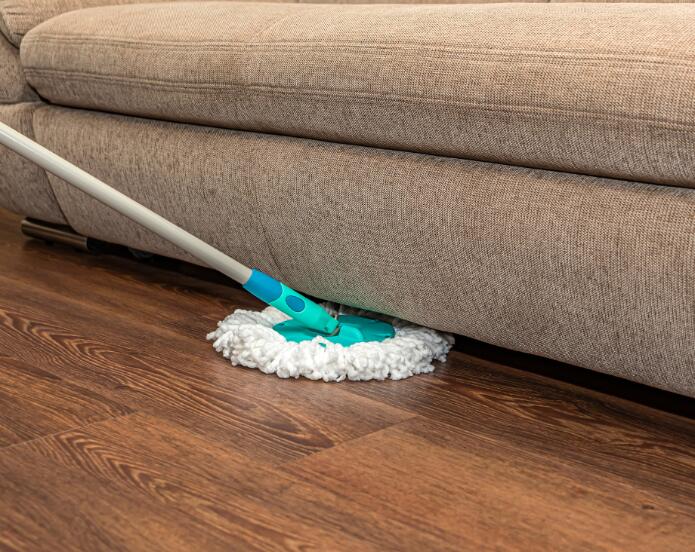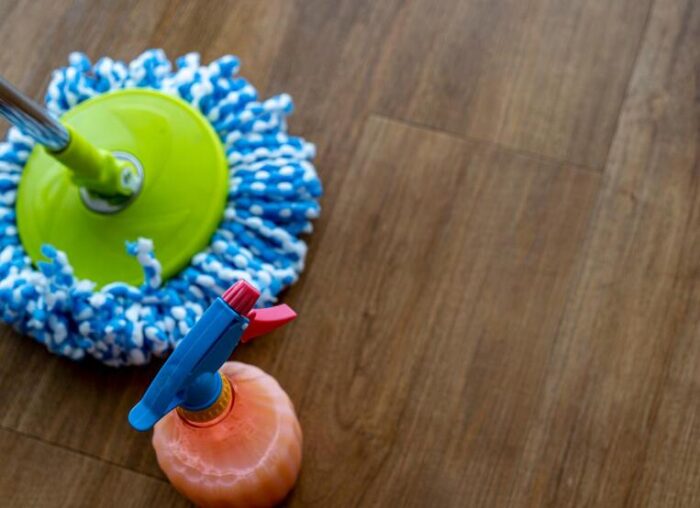If you have vinyl floors, you know they require special care. You can’t just use any old mop and expect them to stay in pristine condition. In order to keep your vinyl floors looking their best, you need to use the right tools. That’s why we’ve put together this guide on how to choose the best mop for vinyl floors.
When it comes to choosing a mop for vinyl floors, there are a few things you need to keep in mind. First of all, you need to make sure that the mop is designed for use on vinyl floors. There are many different types of mops on the market, but not all of them are appropriate for use on vinyl.
Another thing to keep in mind is the material of the mop head. The material of the mop head will determine how well the mop cleans and how gentle it is on your floors. For example, microfiber mops are very effective at picking up dirt and debris, but they can also be quite harsh on delicate surfaces like vinyl.
Finally, you need to consider the size of the mop head. If the mop head is too large, it will be difficult to maneuver around tight spaces and corners.
Keep reading to learn more about it!
Which Is Better for Vinyl Plank Floors: Microfiber Mop vs. Cotton Mop?
Both the microfiber and cotton mops are usually used on vinyl plank floors since they facilitate easy and safe cleaning of these floor types. Nonetheless, these mops usually differ in some aspects, qualifying one as the better of the other one. Below is a short review of these mops.
-
Cotton Mop
Cotton mops have existed for centuries and are the major cleaning material on many floors. Technological advancement resulted in the innovation and creation of the microfiber material, and since then, microfiber has often outshined the cotton mops.
Comparing the two, these mops are often both quite soft and gentle; thus, sure not to scratch/damage the vinyl floors in any way during cleaning.
Another common feature among the two is that they are highly absorbent and capable of retaining a tremendous amount of liquid.
Nonetheless, cotton mops often come with several shortcomings, such as the fact that they facilitate cross-contamination from the absorption of pathogens due to their organic manufacture materials.
Cotton mops often need water for efficiency, leaving the cleaned floor super wet and watery despite continually drying, which could damage the vinyl plank floors.
-
Microfiber Mop
The microfiber mops, on the other hand, often presents with additional benefits when used.
For instance, unlike cotton mops, they often absorb the dirt on the floor instead of pushing them around. Thus, they are convenient for disinfecting vinyl floors since they absorb large percentages of pathogens, leaving the floors clean and safe.
They have a longer lifespan, easily maneuverable, easy to clean, leaves a dried floor surface, often used for dry and wet cleaning, and come with quite a number of additional features.
Microfiber mops are often considered eco-friendly since they are long-lasting, recyclable, reusable, and generally use less water/cleaning solution.
Microfiber mops also come with a few limitations. For instance, maintaining these microfiber pads is also quite hectic and tiresome.
All in all, microfiber mops still outrank cotton mops by far, thus making microfiber mops the best option for vinyl plank floors.
How Do You Care for Luxury Vinyl Plank Flooring with a Mop?
To ensure that your luxury vinyl tiles look their best over the years while adding style to your home, you should regularly take care of them.
Therefore, despite these flooring materials being easy to clean. You should follow the care guide below to help you manage your luxury vinyl floors more appropriately.
The first step is usually to get a doormat. This is usually vital in the process as it will minimize the dragging of dirt to your vinyl floor. Henceforth making cleaning much simple.
The next step is the major one, consisting of a consistent cleaning schedule specifically crafted for luxury vinyl plank floors. This is usually done in two phases, the first one being;
– Everyday cleaning
Neglecting to clean your vinyl floor for even a single day will result in the accumulation of dust and debris from the human traffic associated. These dust particles often have the potential to cause great damage and scuffing on your vinyl floor.
Therefore, using the best mop for vinyl floors, some of which have been reviewed above, you may clean the vinyl floors every day using the dry sweep option or vacuum the floor if the mop has the vacuuming feature.
This routine will guarantee a sparkling clean luxury vinyl floor for your hose.
– Deep cleaning
This is the second phase of the maintenance guide. This is usually recommended to be at least once a week or several times a month.
Here, wet cleaning involves using a wet cloth and some water/cleaning solution in a bucket. Or, you may use a wet mop designed specifically for this purpose.
These mops should have a microfiber mop pad and a cleaning solution. These will facilitate the safe mopping of your vinyl floor, thus removing any dirt that might have been dislodged, leaving your floor smooth and disinfected.
How to Clean Vinyl Plank Floors with Vinegar?
Vinyl floors, despite being easy to clean, are usually selective of the cleaning solutions to be used.
Some cleaning solutions are usually too harsh and may damage the vinyl floors, whereas some may leave behind a foul smell hazardous to the inhabitants of the house. Therefore, the use of natural and readily safe materials such as vinegar is usually recommended.
Vinegar is often excellent for vinyl planks because it never leaves behind residue but only a sparkling clean and fresh floor.
Cleaning vinyl floors using vinegar often warrants for adherence to certain steps to prevent any damages to your floor and yourself. They include;
-
Preparation
This is usually the first step. You should ensure that you have assembled all the necessary equipment and chemicals to be used at this stage.
For instance, the vinegar should be of the apple cider or white variety and not any other type. You should also have a mop, a bucket, hot water, among others.
You will start by sweeping the floor using a dry mop or just vacuum it. This will remove any dirt and debris that might have accumulated on the vinyl floor – thus preventing any possible damage that could arise from abrasion during cleaning.
-
Mixing vinegar solution
This is usually the second step and an essential one too. Your vinegar solution should be properly mixed to the ratio of one cup of the white/cedar vinegar to one gallon of hot water.
This is the standard mixing range, and essentially you should take care not to oversaturate the solution because too acidic cleaning solution could be dangerous.
The white vinegar is often popular for pure disinfection; however, the apple cedar will also add fragrance to your living space.
-
Actual cleaning
This is the third step, and it involves cleaning the vinyl floor.
First, depending on the type of mop an individual uses, you will fill up the reservoir with some of this solution. Then using a soft cloth or preferably a mop, you should start cleaning.
For more stubborn stains, you should try adding some small amounts of liquid soap dish to aid the vinegar solution in breaking the stubborn messes. The process usually involves scrubbing, wringing, and rinsing.
-
Allow the floor to dry
This is the fourth and final step. After the floor is properly cleaned, you should give it some space to properly dry by limiting foot traffic on the cleaned area for some time. The dry floor will prevent occasional slipping and accidents at home/office.
After this, your vinyl floor is ready for some fun and enjoyment.
Conclusion
Choosing the best mop for vinyl floors can be a challenge. There are many factors to consider, such as the type of mop, the material of the mop head, and the size of the mop head. However, by keeping these things in mind, you’ll be able to find a mop that cleans your floors effectively without damaging them in the process.


